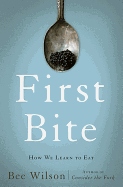
As physical nourishment, a social bonding agent and cultural identity, food is central to human life. Although tastes and cuisines vary wildly across cultures, nearly all of us form powerful habits and attitudes about food from early childhood. These learned behaviors and principles, as well as cultural messages and conversations about food, can have a powerful effect on the rest of our lives. Food writer and social historian Bee Wilson examines eating patterns in the context of weaning, baby food, family meals, eating disorders and nutrition in her fifth book, First Bite.
Wilson (Consider the Fork) begins with a simple premise: humans are born with an innate hunger for food, but nearly everything else that concerns food--tastes, aversions, habits, disorders, attitudes--is learned. There are hundreds of reasons that people relate to food in complicated, often unhealthy ways. However, she argues, it is possible to change some of that behavior, to make food "a daily source of delight rather than something to fight against." She draws on a variety of research to explore the complex relationship humans have with food, which often begins as early as toddlerhood.
Wilson makes the case for thoughtful eating, intentional meal planning and a willingness to experiment with new foods. First Bite is both a rich social history for those interested in the relationship people have with food and an encouraging word for harried parents hoping to expand their children's culinary horizons. Since the human need for food is constant and vital, Wilson points out, there is always the opportunity for change and growth--one bite at a time. --Katie Noah Gibson, blogger at Cakes, Tea and Dreams

